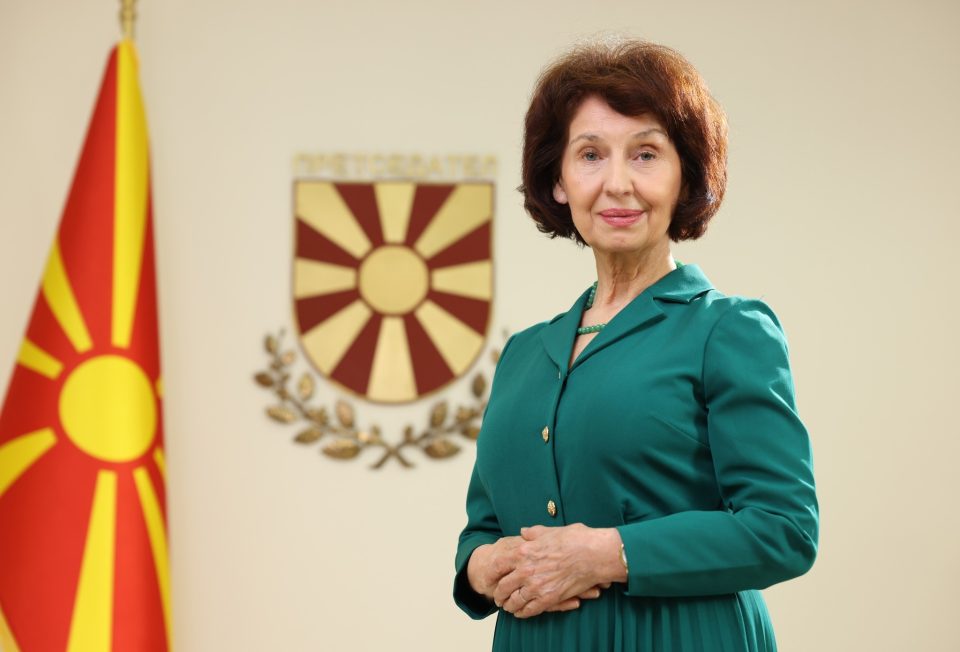I ask for understanding. We have the Prespa Agreement. We changed the Constitution, updated documents for both domestic and international purposes, and even changed manhole covers. However, in a treaty involving two parties, both sides must cooperate. A rope has two ends, and usually, two people pull it. I believe we have acted very responsibly regarding the Prespa Agreement, fulfilling our obligations even before the deadlines, but I am not sure that Greece has done the same. You will still see ‘Skopia,’ ‘FYROM,’ but not ‘North Macedonia,’ President Gordana Siljanovska-Davkova said late Thursday on Kanal 5 TV.
She mentioned that what Kotzias said holds true – Greece, as the party with whom we signed the Agreement, had a special obligation to remind the EU that we need to open chapters for the implementation of the Prespa Agreement.
She also added that Greece or the EU should advise Bulgaria, as it is claimed that there are no negotiations on history, culture, heritage, and language, while we, as she said, are precisely doing that in the historical commissions.
Siljanovska-Davkova addressed the omission of ‘North Macedonia’ in her presidential oath, stating that it was not an act of defiance nor an attempt to irritate anyone, but rather a Socratic approach. She noted that the Electoral Code has not yet been updated with the new name and mentioned she did not notice if the Greek ambassador left the inauguration because she was preoccupied with the ceremony.
“The name is the greatest identity symbol, and it came from within me. I know what is right, but when people sing the national anthem, they cry and place their hands on their hearts. It’s something similar with the name. I don’t understand how some people fail to grasp that with certain things, one cannot be rational; there is an inseparable connection between the heart and the mind, and I am expressing that. For 60 years, it has always been the Republic of Macedonia, and that’s the way it is. It’s not about being stubborn; I was following a Socratic approach. The Electoral Code still lists the name as the Republic of Macedonia. The oath is precisely stated there as the Republic of Macedonia. I intended to show that an adjective is just an adjective, while the essence is Macedonia. I wanted to adhere to the Prespa Agreement, which in Article 7, Paragraph 3, outlines when the name Macedonia can be used, and the adjective is therefore contextually appropriate. Perhaps this was influenced by the fact that the Parliament Speaker used the term North 25 times in just a few minutes. I do not understand this logic,” said Siljanovska-Davkova, noting that in many countries, oaths include the term “republic” as in France, rather than the state’s name itself.
The President reiterated once again that she is not violating the Prespa Agreement.
“Lately, I hear that both agreements must be respected. I am not violating the Prespa Agreement; it states that we need to change the documents, but also after the opening of the first and subsequent chapters. Who opens the chapters and decides on that? The EU. Did anyone say that? Greece should have said it. Not only have we not opened a chapter, but now we need to amend the Constitution to start negotiations. Not a single article in the treaty with Bulgaria states that we need to amend the Constitution. I told Macron that his philosophical thesis about the EU is outstanding, but philosophy cannot exist without principles and values. The EU’s own treaties foresee sanctions if any member state violates fundamental values and principles,” Siljanovska-Davkova said.
In Switzerland, during the meeting with Mitsotakis, she said that she expects the two countries to behave in a neighborly manner, and Nimetz’s statement that we should be proud of the new name has created confusion.
“Nimetz created confusion for me with his statement. Telling someone to be proud of a name they did not choose themselves, because the referendum was not successful, I think is unethical,” Siljanovska-Davkova said.
When asked whether she will refrain from saying the name North Macedonia over the next five years, Siljanovska-Davkova emphasized: ‘Everyone knows that I am the president of this state, which is called that in the Constitution. Why should I repeat it? Do our Greek colleagues constantly say Hellenic Republic? No. I respect the agreements. It is not true that we are breaking them; rather, someone else is breaking them,’” Siljanovska-Davkova said.





Comments are closed for this post.